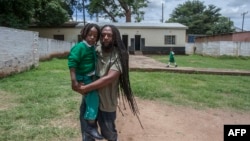Malawian lawyers representing the families argue that the Southern African nation’s Ministry of Education has long sidelined Rastafarian children by pushing them to cut their hair or forcing some parents to enroll their children into private schools.
In 2020, the families of the two children an obtained an injunction after turning to the courts arguing that the government policy was discriminatory.
Last month, the government requested the case dismissed arguing there is no such policy. However, in her verdict, Judge Zione Ntaba said the government argument was shocking.
Chikondi Chijozi, the lawyer representing the two children, said the government policy is violating Rastafarians right to an education.
"The problem is that we are denying the Rastafarian children access to education because if they are not allowed to go to government schools and if they don’t have money it means that they are not going to be educated," Chijozi said.
Chijozi said they applied for judicial review to establish whether the policy is lawful or constitutional and whether the policy should be allowed in government schools.
Attorney General Chakaka Nyirenda had called on presiding Judge Ntaba to stop hearing the case arguing that there is no government policy against dreadlocks and that schools were acting alone by banning Rastafarian students.
"This matter came to court in 2017, and we are here in 2023 when we are having the hearing. So in between, the attorney general had acknowledged that indeed there was this practice happening, and he had indicated to the claimants that he would want to engage the ministry (of education) on this – that it should stop because it’s not in line with the Constitution," Chijozi said.
Judge Ntaba dismissed the government application and said she was shocked by the way the attorney general handled the case, primarily when the claimants are children.
Ntaba also adjourned the hearing of the judicial review until March 14.
Ras Patrick Galawanda, the education and peace ambassador for Rastafarians in the Malawi said Ntaba’s ruling is promising for the children.
"My feeling is that we will win the battle because wherever we go each and everyone wants to be a Rasta. So, it’s a winning battle," Galawanda said.
"I believe that contact and dialogue is the most important thing because other side must hear (our) side. Because most of the time they just judge the book without reading what’s inside the book," he added.





